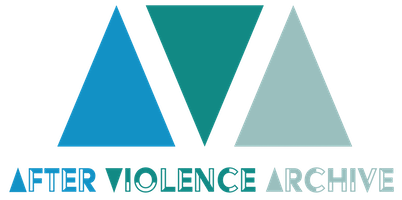The records in the After Violence Archive represent a wide range of lived experiences and perspectives. At the heart of each of these records are individuals processing and making sense of the complex realities they have witnessed. As such, the archive contains detailed descriptions of violence, trauma, death, coercion, neglect, and the withholding of resources and care. These stories often implore us to look inward and ask: how did we get here? Where are we going? What do we want the future to look like, and—importantly—how are we going to build that future together?
When engaging with interviews and materials in the archive, we ask that you do so with a willingness to listen and a commitment to reflect. There is no perfect vocabulary for describing pain—in fact, we don’t want there to be—but we are committed to always revisiting language and description to account for the deeply personal, emotional impact of these narratives and their continued life in the After Violence Archive. The language you encounter from narrators may be jarring, upsetting, or new to you. It may also be deeply familiar, which in itself can cause distress. If you come across something in our description or keywords that you believe contains harmful language, or if you come across material that you believe requires a care statement about its contents, please let us know by emailing archive@texasafterviolence.org.
We also ask that you engage with the archive only if you are in a space to hold these difficult narratives—many of which touch on violent realities that you may have proximity to or direct experience with—-and that you remember to care for yourself as you simultaneously care for and engage with the stories in the After Violence Archive.
At Texas After Violence Project, we believe that these narratives are crucial to futures in which care and accountability are prioritized over punishment and retribution. Thank you for engaging with the stories in the After Violence Archive.
Last updated: 5/14/24
